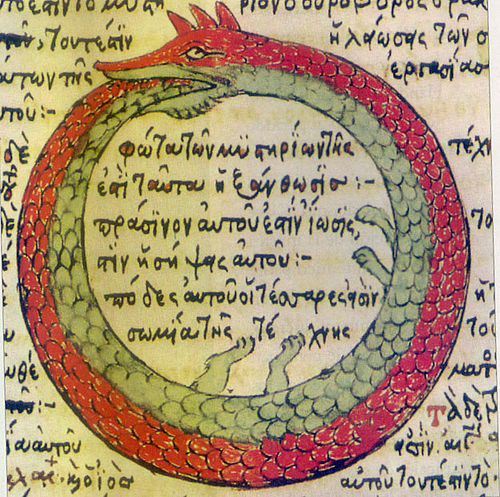Allegorynoun
The representation of abstract principles by characters or figures.
Allegorynoun
A picture, book, or other form of communication using such representation.
Allegorynoun
A symbolic representation which can be interpreted to reveal a hidden meaning, usually a moral or political one.
Allegorynoun
A category that retains some of the structure of the category of binary relations between sets, representing a high-level generalisation of that category.
Allegorynoun
A figurative sentence or discourse, in which the principal subject is described by another subject resembling it in its properties and circumstances. The real subject is thus kept out of view, and we are left to collect the intentions of the writer or speaker by the resemblance of the secondary to the primary subject.
Allegorynoun
Anything which represents by suggestive resemblance; an emblem.
Allegorynoun
A figure representation which has a meaning beyond notion directly conveyed by the object painted or sculptured.
Allegorynoun
a short moral story (often with animal characters)
Allegorynoun
a visible symbol representing an abstract idea
Allegorynoun
an expressive style that uses fictional characters and events to describe some subject by suggestive resemblances; an extended metaphor
Allegorynoun
a story, poem, or picture that can be interpreted to reveal a hidden meaning, typically a moral or political one
Allegorynoun
a symbol.
Allegory
As a literary device, an allegory is a narrative in which a character, place, or event is used to deliver a broader message about real-world issues and occurrences. Authors have used allegory throughout history in all forms of art to illustrate or convey complex ideas and concepts in ways that are comprehensible or striking to its viewers, readers, or listeners.
Analogynoun
A relationship of resemblance or equivalence between two situations, people, or objects, especially when used as a basis for explanation or extrapolation.
Analogynoun
A resemblance of relations; an agreement or likeness between things in some circumstances or effects, when the things are otherwise entirely different. Thus, learning enlightens the mind, because it is to the mind what light is to the eye, enabling it to discover things before hidden.
Analogynoun
A relation or correspondence in function, between organs or parts which are decidedly different.
Analogynoun
Proportion; equality of ratios.
Analogynoun
Conformity of words to the genius, structure, or general rules of a language; similarity of origin, inflection, or principle of pronunciation, and the like, as opposed to anomaly.
Analogynoun
an inference that if things agree in some respects they probably agree in others
Analogynoun
drawing a comparison in order to show a similarity in some respect;
Analogynoun
the religious belief that between creature and creator no similarity can be found so great but that the dissimilarity is always greater; language can point in the right direction but any analogy between God and humans will always be inadequate
Analogynoun
a comparison between one thing and another, typically for the purpose of explanation or clarification
Analogynoun
a correspondence or partial similarity
Analogynoun
a thing which is comparable to something else in significant respects
Analogynoun
a process of arguing from similarity in known respects to similarity in other respects
Analogynoun
a process by which new words and inflections are created on the basis of regularities in the form of existing ones.
Analogynoun
the resemblance of function between organs that have a different evolutionary origin.
Analogy
Analogy (from Greek ἀναλογία, analogia, , from ana- [also , ] + logos [also ]) is a cognitive process of transferring information or meaning from a particular subject (the analog, or source) to another (the target), or a linguistic expression corresponding to such a process. In a narrower sense, analogy is an inference or an argument from one particular to another particular, as opposed to deduction, induction, and abduction, in which at least one of the premises, or the conclusion, is general rather than particular in nature.
















